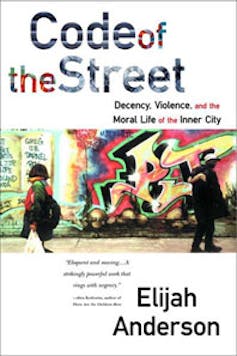School suspensions don't stop violence – they help students celebrate it
- Written by Charles Bell, Assistant Professor, Illinois State University
When school officials suspend students, the idea is to maintain a safe environment and deter violence[1] and other problematic behavior on the school campus.
But when I interviewed 30 children in southeast Michigan who had been suspended from school, I learned that suspensions might actually be having the opposite effect.
That’s because students use school suspensions strategically to earn respect and build a reputation for being tough. I made this finding – which will be published in the Journal of Crime and Justice[2] – as part of my ongoing research[3] into how black students and their parents view school discipline, school safety measures and the police.
To interview the students, I obtained permission from their parents. I also took a look at students’ disciplinary records. All of the students I spoke with were black. I only spoke with 30 students because after a short while, the same themes began to emerge. I also interviewed 30 parents.
What the students and parents told me has implications not only for educators, parents and policymakers, but for the millions of students[4] who are suspended in the U.S. each year. The implications are even more serious for black students, who represented 31 percent[5] of all law enforcement referrals and arrests in the 2015-2016 school year, even though they only represented 15 percent of the school population.
Doesn’t deter violence
In interview after interview, students told me that being suspended from school would not stop them from fighting in the future.
For example, a 9th-grade girl who got suspended from school five times for fighting said being suspended “probably makes it more likely” for her to fight because it will lead other students to test her.
“So if you push my buttons or press me the wrong way, I will end up fighting you and I told my mom this, and she said if you fight … OK … just let me know,” the student said.
A 10th-grade girl who has been suspended from school more than 30 times told me that being suspended made her seem “more tough and popular” and helped her establish friendships with other students.
“Because they’d be like ‘well we can be friends because I know you have my back no matter what,’” the girl explained. “If they don’t think you’re tough enough they will bully you.”
 Several girls in the study indicated that fighting gives a boost to their reputation.
Chris Bourloton/www.shutterstock.com[6]
Several girls in the study indicated that fighting gives a boost to their reputation.
Chris Bourloton/www.shutterstock.com[6]
A 10th-grade boy who has been suspended 12 times also told me his popularity “went up” after being kicked out of school.
“People like people to get suspended,” the boy said. “You get in trouble, ‘Oh, you coming back, bro? What’s up?’ Everybody trying to talk to you when you come back.”
In my interviews with parents, I found they often advised their children not to walk away from fights.
“The fantasy is that we believe we will only be hit once with a soft right paw and will be able to walk away to tell the authority and they come and resolve the problem,” the father of a 10th-grade girl who has been suspended 15 times told me. “The reality is that you are either going to get hit to get knocked out or you are going to get hit and keep getting hit. You only get to walk away after somebody ass has been kicked.”
Street code in effect
So what lurks behind the rationale of students who see being suspended as a way to get a rep, so to speak? For clues and answers to this question, I drew from sociologist Elijah Anderson’s “Code of the Street[7].” I wanted to see how the social norms that Anderson found were embedded in street culture might influence violence in school.
 W. W. Norton & Company, Inc.[8]
The comments I got from the students show how the code of the street that Anderson describes in his book does not cease to operate once students pass through the schoolhouse door. Rather, the social norms that are embedded in street culture establish a code that regulates violence in public high schools.
Anderson found that respect is difficult to obtain and easy to lose on the streets, and so people who live by this code believe respect must be continuously earned. Some of the students in my study got up to 30 out-of-school suspensions for their repeated involvement in fights, suggesting the same dynamics were at play as they sought to exhibit toughness and maintain respect.
Tough choices
This poses a serious dilemma for educators and policymakers who have a duty to maintain a safe school environment. On one hand, every school principal needs a reasonable deterrent that discourages violence and prioritizes student safety. On the other hand, my findings show out-of-school suspension actually exacerbates physical violence in the school setting and sets up a competition for popularity based on perceived toughness and respect.
Given the widespread use of school suspension in America’s schools, this is a dilemma that cannot be ignored. The most recent U.S. Department of Education Office of Civil Rights report shows approximately 2.7 million children[9] received a school suspension during the 2015 to 2016 school year. In light of what suspended students told me, one has to wonder how many of those millions of suspensions were actually caused by other suspensions.
The issue takes on an added layer of importance when you consider how U.S. education secretary Betsy DeVos recently decided to rescind an Obama-era policy[10] that advised schools to address racial disparities in school discipline. Her argument was that school discipline is best left to schools. But evidence shows black children are suspended at disproportionately higher rates[11] than their white counterparts.
‘School Suspensions Are an Adult Behavior,’ Rosemarie Allen’s TEDxMileHigh talk.The need for alternatives
My findings also show the need for a thorough review of the consequences associated with school suspension. Prior research has consistently shown the adverse effects associated with out-of-school suspension, such as poor academic achievement[12], school dropout[13], and future incarceration[14].
So what should school leaders and policymakers do if suspensions are so problematic? Since research shows that conflicts typically originate in a child’s neighborhood and carry over[15] into the school setting, I think it would be wise for school leaders to consider establishing partnerships with violence prevention organizations such as Cure Violence[16] and CeaseFire[17]. Such organizations are often uniquely skilled[18] at identifying the source of a conflict and effective at intervening[19] before a violent altercation occurs. Violence prevention partnerships would help identify conflicts when they are still brewing in the streets – and potentially stop them before they take place in school.
School leaders can improve school culture[20] if they involve students in the development of school discipline policies, reward students for positive behaviors and provide guidance on conflict resolution.
Regardless of what kind of preventive measure or remedy is pursued, it’s important to include the voices of students in the way I have done in my study. There’s simply no way to fully understand the root of school violence or how to effectively deter it if students are shut out of the discussion.
W. W. Norton & Company, Inc.[8]
The comments I got from the students show how the code of the street that Anderson describes in his book does not cease to operate once students pass through the schoolhouse door. Rather, the social norms that are embedded in street culture establish a code that regulates violence in public high schools.
Anderson found that respect is difficult to obtain and easy to lose on the streets, and so people who live by this code believe respect must be continuously earned. Some of the students in my study got up to 30 out-of-school suspensions for their repeated involvement in fights, suggesting the same dynamics were at play as they sought to exhibit toughness and maintain respect.
Tough choices
This poses a serious dilemma for educators and policymakers who have a duty to maintain a safe school environment. On one hand, every school principal needs a reasonable deterrent that discourages violence and prioritizes student safety. On the other hand, my findings show out-of-school suspension actually exacerbates physical violence in the school setting and sets up a competition for popularity based on perceived toughness and respect.
Given the widespread use of school suspension in America’s schools, this is a dilemma that cannot be ignored. The most recent U.S. Department of Education Office of Civil Rights report shows approximately 2.7 million children[9] received a school suspension during the 2015 to 2016 school year. In light of what suspended students told me, one has to wonder how many of those millions of suspensions were actually caused by other suspensions.
The issue takes on an added layer of importance when you consider how U.S. education secretary Betsy DeVos recently decided to rescind an Obama-era policy[10] that advised schools to address racial disparities in school discipline. Her argument was that school discipline is best left to schools. But evidence shows black children are suspended at disproportionately higher rates[11] than their white counterparts.
‘School Suspensions Are an Adult Behavior,’ Rosemarie Allen’s TEDxMileHigh talk.The need for alternatives
My findings also show the need for a thorough review of the consequences associated with school suspension. Prior research has consistently shown the adverse effects associated with out-of-school suspension, such as poor academic achievement[12], school dropout[13], and future incarceration[14].
So what should school leaders and policymakers do if suspensions are so problematic? Since research shows that conflicts typically originate in a child’s neighborhood and carry over[15] into the school setting, I think it would be wise for school leaders to consider establishing partnerships with violence prevention organizations such as Cure Violence[16] and CeaseFire[17]. Such organizations are often uniquely skilled[18] at identifying the source of a conflict and effective at intervening[19] before a violent altercation occurs. Violence prevention partnerships would help identify conflicts when they are still brewing in the streets – and potentially stop them before they take place in school.
School leaders can improve school culture[20] if they involve students in the development of school discipline policies, reward students for positive behaviors and provide guidance on conflict resolution.
Regardless of what kind of preventive measure or remedy is pursued, it’s important to include the voices of students in the way I have done in my study. There’s simply no way to fully understand the root of school violence or how to effectively deter it if students are shut out of the discussion.
References
- ^ deter violence (pediatrics.aappublications.org)
- ^ Journal of Crime and Justice (www.tandfonline.com)
- ^ ongoing research (scholar.google.com)
- ^ millions of students (www.washingtonpost.com)
- ^ 31 percent (www.washingtonpost.com)
- ^ Chris Bourloton/www.shutterstock.com (www.shutterstock.com)
- ^ Code of the Street (sociology.yale.edu)
- ^ W. W. Norton & Company, Inc. (books.wwnorton.com)
- ^ 2.7 million children (www.washingtonpost.com)
- ^ rescind an Obama-era policy (blogs.edweek.org)
- ^ suspended at disproportionately higher rates (www.edweek.org)
- ^ poor academic achievement (doi.org)
- ^ school dropout (doi.org)
- ^ future incarceration (doi.org)
- ^ carry over (www.tandfonline.com)
- ^ Cure Violence (cureviolence.org)
- ^ CeaseFire (www.philaceasefire.com)
- ^ uniquely skilled (johnjayrec.nyc)
- ^ effective at intervening (cureviolence.org)
- ^ improve school culture (www.tandfonline.com)
Authors: Charles Bell, Assistant Professor, Illinois State University

